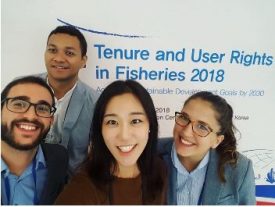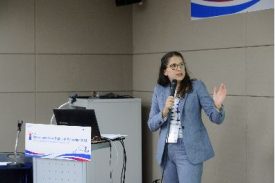SMEA Summer: Studying Fisheries Management Around the World (Literally)
By Priscilla Rivas
 This summer, I was fortunate enough to intern in Rome, Italy with the Fisheries, Economics, and Institutions Branch (FIAP) at the Food and Agriculture Organization of the United Nations (FAO). During my internship, I co-authored a paper about fisheries quota share programs, and worked with FAO employees focused on tenure and user rights in fisheries. Tenure and user rights relate to how individuals are able to utilize resources and have been increasingly studied in recent years, but there is a lot of debate surrounding exactly what the terms mean and what management policies capture these concepts. Since my capstone project for SMEA is also related to this topic, I submitted an abstract for the Tenure and User Rights in Fisheries meeting hosted by FAO in Yeosu, Korea, which brought together legal experts, fisheries managers, academics, and other professionals to start a conversation on what these terms mean. Then, a mere six days after returning to Seattle from Rome, I was on a flight to Seoul.
This summer, I was fortunate enough to intern in Rome, Italy with the Fisheries, Economics, and Institutions Branch (FIAP) at the Food and Agriculture Organization of the United Nations (FAO). During my internship, I co-authored a paper about fisheries quota share programs, and worked with FAO employees focused on tenure and user rights in fisheries. Tenure and user rights relate to how individuals are able to utilize resources and have been increasingly studied in recent years, but there is a lot of debate surrounding exactly what the terms mean and what management policies capture these concepts. Since my capstone project for SMEA is also related to this topic, I submitted an abstract for the Tenure and User Rights in Fisheries meeting hosted by FAO in Yeosu, Korea, which brought together legal experts, fisheries managers, academics, and other professionals to start a conversation on what these terms mean. Then, a mere six days after returning to Seattle from Rome, I was on a flight to Seoul.
At the first day of the conference, there was a small reception where attendees could meet each other and begin talking about our work. Even though this was just the beginning of the week, I could immediately see the multitude of issues facing fisheries management. I spoke with people from Fiji, Guatemala, Australia, and Canada (just to name a few) and each were preparing for presentations on unique user rights issues in their oceans. There were over 60 presentations throughout the course of the conference, so rather than try to summarize each one or even a few, I think it’s best to reflect on some of the main takeaways from the last session of the meeting.
 Meaningful improvements in fisheries management often come from the bottom up with strong leadership from the fishing community – At the conference, one of the main topics was how tenure and user rights in fisheries can help achieve the Sustainable Development Goals (SDGs) put into effect in 2016. In talking about this, there were conversations surrounding the lack of a legal framework that could help achieve the SDGs. Many of the presentations throughout the week showcased how bottom-up management that is inclusive of fishers’ traditional knowledge can be very effective. If new legal frameworks are to be put in place, they should be inclusive of all stakeholders.
Meaningful improvements in fisheries management often come from the bottom up with strong leadership from the fishing community – At the conference, one of the main topics was how tenure and user rights in fisheries can help achieve the Sustainable Development Goals (SDGs) put into effect in 2016. In talking about this, there were conversations surrounding the lack of a legal framework that could help achieve the SDGs. Many of the presentations throughout the week showcased how bottom-up management that is inclusive of fishers’ traditional knowledge can be very effective. If new legal frameworks are to be put in place, they should be inclusive of all stakeholders.
Managing fish is about managing people, and managing people is about communication – FAO has released documents related to tenure and user rights including the Voluntary Guidelines on the Responsible Governance of Tenure (VGGT) and the Voluntary Guidelines for Sustaining Small-Scale Fisheries (SSF Guidelines), but in many countries (especially developing countries) small-scale fishers never see these guidelines, and many have not heard of them, and therefore cannot begin implementing them. Communication channels need to be improved to assist in sustainable use of the resource.
I am so grateful to have been able to take part in a conference with so many people from different disciplines and countries coming together to talk about these fisheries issues. Although my summer was not spent doing research directly related to my capstone project, my experiences at FAO in Rome and at the meeting in Korea have provided me with new perspectives to consider. After an eventful summer, I am excited to get back into the swing of things at SMEA!